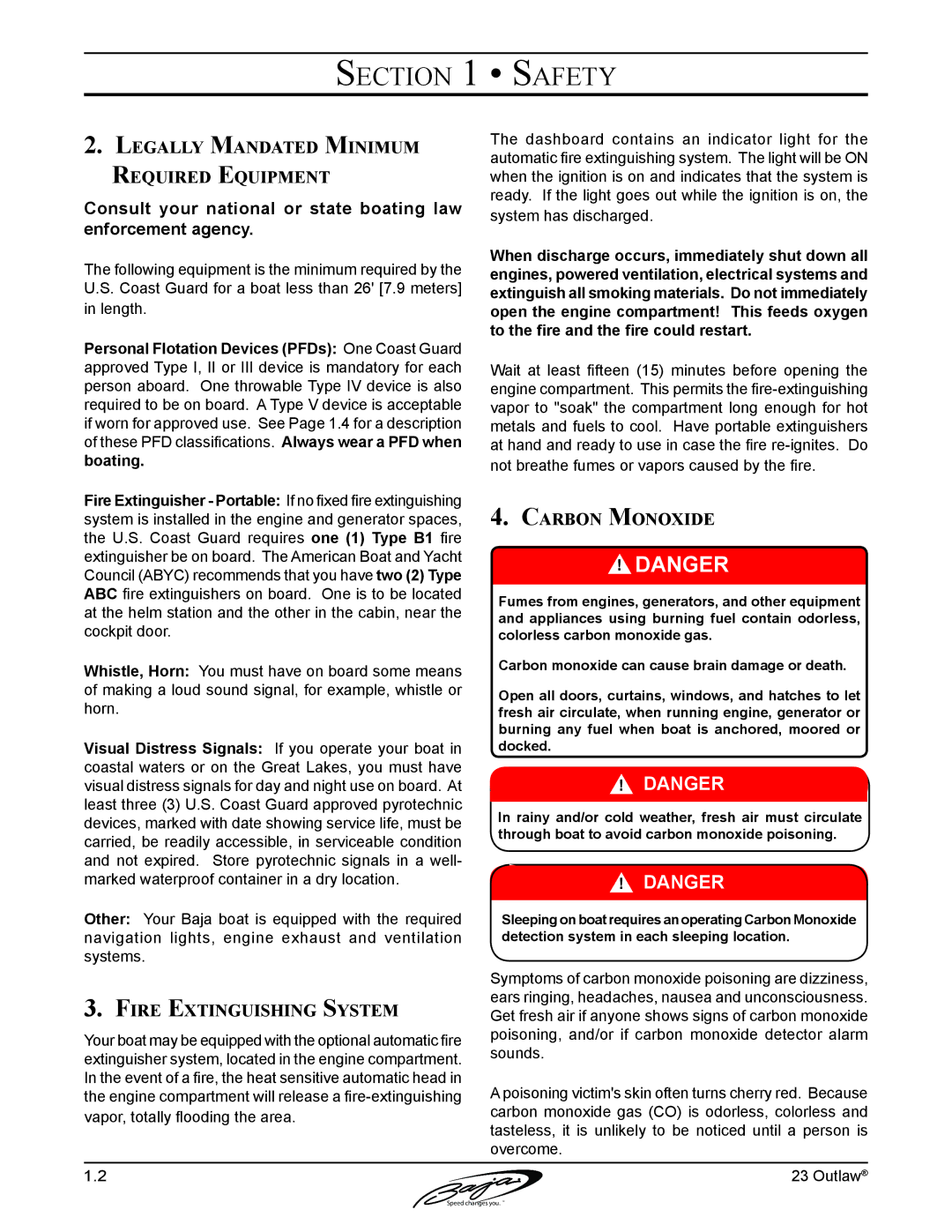
Section 1 • Safety
2.Legally Mandated Minimum Required Equipment
Consult your national or state boating law enforcement agency.
The following equipment is the minimum required by the U.S. Coast Guard for a boat less than 26' [7.9 meters] in length.
Personal Flotation Devices (PFDs): One Coast Guard approved Type I, II or III device is mandatory for each person aboard. One throwable Type IV device is also required to be on board. A Type V device is acceptable if worn for approved use. See Page 1.4 for a description of these PFD classifications. Always wear a PFD when boating.
Fire Extinguisher - Portable: If no fixed fire extinguishing system is installed in the engine and generator spaces, the U.S. Coast Guard requires one (1) Type B1 fire extinguisher be on board. The American Boat and Yacht Council (ABYC) recommends that you have two (2) Type ABC fire extinguishers on board. One is to be located at the helm station and the other in the cabin, near the cockpit door.
Whistle, Horn: You must have on board some means of making a loud sound signal, for example, whistle or horn.
Visual Distress Signals: If you operate your boat in coastal waters or on the Great Lakes, you must have visual distress signals for day and night use on board. At least three (3) U.S. Coast Guard approved pyrotechnic devices, marked with date showing service life, must be carried, be readily accessible, in serviceable condition and not expired. Store pyrotechnic signals in a well- marked waterproof container in a dry location.
Other: Your Baja boat is equipped with the required navigation lights, engine exhaust and ventilation systems.
3.Fire Extinguishing System
Your boat may be equipped with the optional automatic fire extinguisher system, located in the engine compartment. In the event of a fire, the heat sensitive automatic head in the engine compartment will release a
The dashboard contains an indicator light for the automatic fire extinguishing system. The light will be ON when the ignition is on and indicates that the system is ready. If the light goes out while the ignition is on, the system has discharged.
When discharge occurs, immediately shut down all engines, powered ventilation, electrical systems and extinguish all smoking materials. Do not immediately open the engine compartment! This feeds oxygen to the fire and the fire could restart.
Wait at least fifteen (15) minutes before opening the engine compartment. This permits the
4.Carbon Monoxide
!DANGER
Fumes from engines, generators, and other equipment and appliances using burning fuel contain odorless, colorless carbon monoxide gas.
Carbon monoxide can cause brain damage or death.
Open all doors, curtains, windows, and hatches to let fresh air circulate, when running engine, generator or burning any fuel when boat is anchored, moored or docked.
!DANGER
In rainy and/or cold weather, fresh air must circulate through boat to avoid carbon monoxide poisoning.
!DANGER
Sleeping on boat requires an operating Carbon Monoxide detection system in each sleeping location.
Symptoms of carbon monoxide poisoning are dizziness, ears ringing, headaches, nausea and unconsciousness. Get fresh air if anyone shows signs of carbon monoxide poisoning, and/or if carbon monoxide detector alarm sounds.
A poisoning victim's skin often turns cherry red. Because carbon monoxide gas (CO) is odorless, colorless and tasteless, it is unlikely to be noticed until a person is overcome.
1.2 | R |
23 Outlaw®
Speed changes you. TM.
